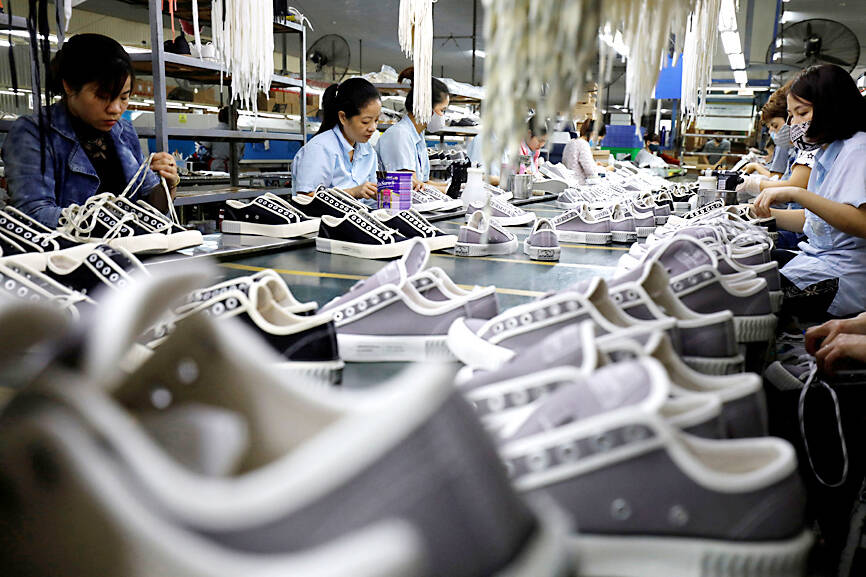Vietnam is vulnerable to becoming the incoming US administration’s next target for tariffs as data show its trade surplus with the US ballooning, industry executives and analysts said.
The communist-run country, home to large industrial operations of US multinationals such as Apple Inc, Google, Nike Inc and Intel Corp, has the fourth-highest commercial surplus with the US, topped only by China, the EU and Mexico.
US trade data released on Thursday showed the country’s deficit with Vietnam reached US$102 billion in the first 10 months of this year, nearly a 20 percent increase over the same period last year.

Photo: Reuters
“For [US president-elect Donald] Trump the main metric is the trade deficit, and the Vietnam number is bad,” said Deborah Elms, head of trade policy at the Asia-based Hinrich Foundation.
“Vietnam is an ideal candidate for early action because it cannot easily retaliate,” she said.
Trump, who is to take office next month, threatened tariffs of up to 20 percent on all US imports during his election campaign.
His son Eric Trump, a top adviser, has cited Vietnam among countries that “ripped off” the US, according to a video shown last week at a business conference in Hanoi organized by the American Chamber of Commerce in Hanoi.
At the event several businesspeople and trade association representatives expressed concern about possible tariffs on Vietnam.
“The new tariffs are one of the biggest concerns for the [South] Korean industry in Vietnam,” Hong Sun, head of South Korea’s chamber of commerce in Vietnam, told the conference.
South Korea’s Samsung Electronics Co is a major exporter of smartphones and other electronic devices to the US from Vietnam
Vietnam’s Ministry of Foreign Affairs did not reply to a request for comment on potential tariffs, but Vietnamese officials have repeatedly urged Washington to maintain seamless trade.
In another sign Vietnam could face tariffs, Donald Trump picked Peter Navarro to be his senior counselor for trade and manufacturing.
Navarro has said tariffs on Vietnam would be highly effective in cutting the US trade deficit, writing in the Project 2025 proposals seen by many policymakers in Washington as a blueprint for the incoming Donald Trump administration.
“Navarro has been a well-known expert under the [Donald] Trump administration for increasing the size of the American manufacturing sector, imposing high tariffs, and repatriating global supply chains,” said Nguyen Hung, a specialist in supply chains at RMIT University Vietnam.
Vietnam benefited from trade barriers Donald Trump imposed on Beijing in his first term, which spurred manufacturers to shift production out of China.
With nearly one-third of Vietnam’s exports now going to the US, the country would need to improve the traceability of goods and components to dispel concerns of being used merely as an assembling site for products made in China, Hung said.
The country could partly offset its large trade surplus by boosting its imports from the US, including possibly liquefied natural gas, drugs and airplanes, officials have said.
However, it is unclear whether Vietnamese authorities support these offsetting measures and how significant they could be.
“I don’t think Vietnam is in a position to buy quickly and enough” to materially reduce its surplus, Elms said.

When an apartment comes up for rent in Germany’s big cities, hundreds of prospective tenants often queue down the street to view it, but the acute shortage of affordable housing is getting scant attention ahead of today’s snap general election. “Housing is one of the main problems for people, but nobody talks about it, nobody takes it seriously,” said Andreas Ibel, president of Build Europe, an association representing housing developers. Migration and the sluggish economy top the list of voters’ concerns, but analysts say housing policy fails to break through as returns on investment take time to register, making the

‘SILVER LINING’: Although the news caused TSMC to fall on the local market, an analyst said that as tariffs are not set to go into effect until April, there is still time for negotiations US President Donald Trump on Tuesday said that he would likely impose tariffs on semiconductor, automobile and pharmaceutical imports of about 25 percent, with an announcement coming as soon as April 2 in a move that would represent a dramatic widening of the US leader’s trade war. “I probably will tell you that on April 2, but it’ll be in the neighborhood of 25 percent,” Trump told reporters at his Mar-a-Lago club when asked about his plan for auto tariffs. Asked about similar levies on pharmaceutical drugs and semiconductors, the president said that “it’ll be 25 percent and higher, and it’ll

CHIP BOOM: Revenue for the semiconductor industry is set to reach US$1 trillion by 2032, opening up opportunities for the chip pacakging and testing company, it said ASE Technology Holding Co (日月光投控), the world’s largest provider of outsourced semiconductor assembly and test (OSAT) services, yesterday launched a new advanced manufacturing facility in Penang, Malaysia, aiming to meet growing demand for emerging technologies such as generative artificial intelligence (AI) applications. The US$300 million facility is a critical step in expanding ASE’s global footprint, offering an alternative for customers from the US, Europe, Japan, South Korea and China to assemble and test chips outside of Taiwan amid efforts to diversify supply chains. The plant, the company’s fifth in Malaysia, is part of a strategic expansion plan that would more than triple

Taiwanese artificial intelligence (AI) server makers are expected to make major investments in Texas in May after US President Donald Trump’s first 100 days in office and amid his rising tariff threats, Taiwan Electrical and Electronic Manufacturers’ Association (TEEMA, 台灣電子電機公會) chairman Richard Lee (李詩欽) said yesterday. The association led a delegation of seven AI server manufacturers to Washington, as well as the US states of California, Texas and New Mexico, to discuss land and tax issues, as Taiwanese firms speed up their production plans in the US with many of them seeing Texas as their top option for investment, Lee said. The